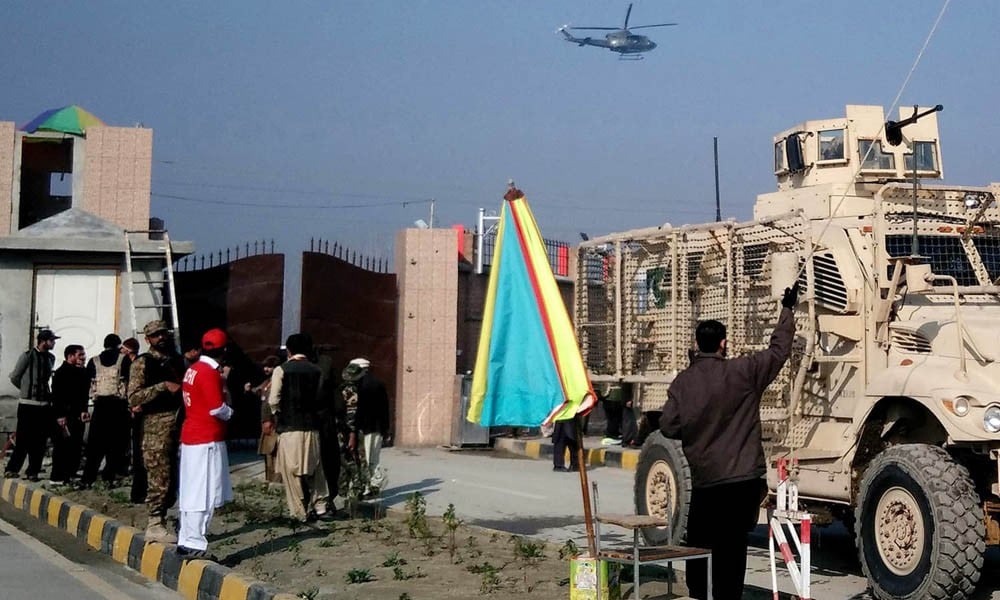
What exactly leads to the tragic repetition of terrorist events post National Action Plan?

Terrorists’ deliberate choice of January 20, the death anniversary of the non-violent paragon Bacha Khan, to attack Bacha Khan University Charsadda was meant to deliver two messages: spreading ignorance and inculcating violence.
The occurrence of a terrorist attack in the backyard of a legendary nonviolent icon, who so earnestly believed in nonviolence and education, makes it imperative to redeem ourselves by figuring out what exactly leads to the tragic repetition of terrorist events post National Action Plan. With BKU’s carnage as a case in point, there are four aspects to look for reasons.
Was it an intelligence failure?
When Pakistani news channels were abuzz with live coverage of gory terrorist assault on BKU, I, while in Jamrud tehsil of Khyber Agency, asked a security official if the incident was the result of an intelligence failure. "The warning of a possible terror raid on educational institutes in Khyber Pakhtunkhwa was already disseminated," the heavyhearted official said. Perhaps, this was corroborated by the closure of Gomal University on January 12 "due to law and order situation and to avoid any mishap", as the notification stated.
Was this the result of security lapse?
The provision of security is the main responsibility of the state. Given the enormity of the task of protecting about 64,000 educational institutions in the province, or any other soft target, in the face of a potential terrorist attack is an uphill task indeed. Nevertheless, there should be no ground for complacency either. Post BKU raid, the terrorists’ threat in a video message to execute further attacks on institutes of learning necessitates constant vigilance.
Was the government policy responsible?
Pakistan’s policy towards Taliban was hardening long before the tragic event of Peshawar APS attack on December 16, 2014. After 9/11, the so-called ‘bad Taliban’ were at the target of the security operations carried out in width and breadth of country, especially FATA. It were the ‘good Taliban’, which -- as many believed -- were pampered. Nonetheless, the APS terror attack was a game changer because it engendered the consensus that eventually resulted in the 20-point National Action Plan.
Post NAP, Pakistan made significant gains against the militant yahoos. However, critical commentators still believe that the good and bad Taliban dichotomy survives even today and that we still suffer as a result thereof. By implication, these commentators believe that there is no good Taliban in the first place.
Any Afghan machination?
An enduring complaint that our Afghan neighbour has been making for long is that from across Pakistan side of the border Taliban end up in Afghanistan to carry out terrorist activities in the country. At present, the incumbent Afghan president Ashraf Ghani is a sane but almost lonely voice surrounded by complaining and hawkish officials who point finger at Islamabad whenever an untoward incident takes place in Afghanistan.
Jingoism both sides of the border notwithstanding, there is no need of tapping into anti-Afghan furor on the mere ground that terrorists used Afghan soil in carrying out attack on BKU. As a matter of fact, in the borderlands, the Afghan government’s writ is as weak as ours had been before the stationing of 150,000 troops in FATA. Neither does the use of Afghan SIMs in the ghastly attack implicate the Afghan government. These SIMs are not only available in border towns of Pakistan but are also functioning. In other words, the terrorists might have used them from either side of the Durand Line.
Who to blame?
There is no denying the fact that a state’s interference in another state takes place behind the farcical façade of ‘plausible deniability’. The whole scheme of things is organised in a way that one can hardly discern any clue of outside involvement. The so-called "concrete evidence" that countries share with each other is easily dismissed on the ground of either being ‘unsubstantiated’ or that the involvement of some ‘hostile elements’ does not incriminate the government.
The history of Pak-Afghan relations is replete with instances of allegations and counter allegations with regards to interference in the internal affairs of each other since 1947 down to the present. For sure, these allegations had germs of truth no matter how unsubstantiated these may have been!
What is the way forward?
Internally, fighting a shadowy enemy requires strengthening intelligence presence. "Due to intelligence based operations (IBOs), we foil terrorist assaults nine times out of ten," the Jamrud based security officer said. "In that one case, we disseminate warning about the terrorists’ target, as we did this time," he added. Additionally, "better border management is the key to thwart terror plot," he contended.
Any border management should take ground reality into account. Overlooking the massive crowds at Torkham from Michini post reminded me of UNHCR September 2008 report -- "Study on cross border population movement between Afghanistan and Pakistan" -- which noted that on an average day of the month 48,943 individuals crossed either side of the Torkham border compared to 23,814 individuals at Spin Boldak. The same study found out that 81.2 per cent of Afghans travelled without any travel papers. Thus, managing the Pak-Afghan border should also entail documenting people from either side of the border. The success of this policy will necessitate the elimination of taking bribes at border.
Besides, no management of the border will stop terror until Afghanistan and Pakistan adopt a common policy on Taliban. Any distinction among Taliban is delusional. There is no guarantee that pro-state Taliban will remain pro-state forever. All anti-state Taliban are breakaway factions of once pro-state Taliban only to give birth to numerous splinter groups including the deadliest offshoot in the form of ISIS’s Afghan chapter, the Islamic State in Khorasan.
Thus, the inevitable need for the two neighbours is to call time on fighting through proxies. As far commemorating Bacha Khan’s death anniversary, establishing peace in the volatile region is the richest tribute to the apostle of nonviolence!